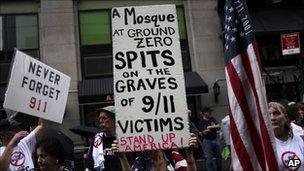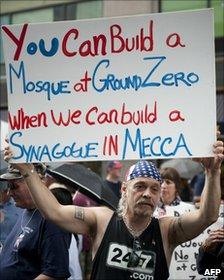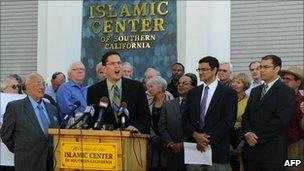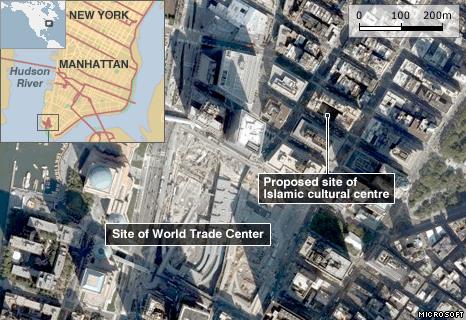Is 'Ground Zero mosque' debate fanning the flames?
- Published

Rival protests have been held at the site
There has been vehement criticism of a Muslim group's plan to build a cultural centre and mosque near Ground Zero, but what does the tone of the debate reveal?
Some opponents of the Cordoba House project, external, the Islamic cultural centre and mosque planned near to the World Trade Center site, have coined jarring juxtapositions to press their point.
"Nazis don't have the right to put up a sign next to the Holocaust museum in Washington," former US House Speaker Newt Gingrich said. "We would never accept the Japanese putting up a site next to Pearl Harbor. There is no reason for us to accept a mosque next to the World Trade Center."
Radio presenter Rush Limbaugh compared the mosque with the idea of putting a Hindu shrine at the USS Arizona memorial at Pearl Harbor, later correcting himself to make clear he meant a Shinto shrine.
Those behind the Cordoba House project, such as Imam Feisal Abdul Rauf, say they want to build something which would assist inter-faith understanding. But some are worried about knock on effects of the debate over the mosque on relations.
"It has exposed a very nasty streak in our society," says Ibrahim Hooper, of the Council on American-Islamic Relations.
'Muslim-bashing'
Eric Boehlert, senior fellow at Media Matters for America, a group which monitors conservative media, says he counted 1,600 references to "mosque" last week across national US cable news networks - a number that reflects the growing scale of the controversy.

Protesters say the mosque is insensitive
The battles are not just limited to Ground Zero. A plan to turn a former convent in Staten Island, New York, into a mosque generated opposition.
In southern California, plans for a mosque near two churches in Temecula Valley have seen activists picket a Muslim site. Another row is rumbling on in Sheboygan, Wisconsin.
"There has just been this eruption of Muslim bashing and Islamophobia," says Mr Boehlert. "It is nothing to do with any serious debate about Ground Zero and what is or isn't appropriate."
Some opponents have implied there could be unfortunate consequences if the Cordoba House plan goes ahead.
Pundit Dick Morris has linked the centre to Muslim religious law - sharia - and to terrorism.
"We're establishing literally a command centre for terrorism right at the 9/11 site," he said.
'Burn a Koran'
Perhaps the most radical opposition reported so far has been from Pastor Terry Jones at the non-denominational Dove World Outreach Centre in Gainesville, Florida.
The pastor gained notoriety recently when he announced that he would be organising a burning of copies of the Koran on 11 September. He disputes the commonly-accepted notion that violent extremists make up only a tiny proportion of Muslims.
"Islam does what Islam teaches," he says.
"What we are trying to do is to send a very clear message to radical Islam that this type of action and the action of Sharia courts is not welcome in America."
His campaign and the call of activists against the Temecula mosque to picket a Muslim site accompanied by dogs - which many Muslims think ritually "unclean" - have sparked concern.

A group of leaders from a number of faiths have supported the mosque plan
But there are many who say that opposition to the New York mosque is rational and reasonable. They believe that while the legal right to build a religious building anywhere is clear, those behind it should not go ahead because it will upset people and offend sensitivities.
Bloggers have drawn parallels between the mosque row and the controversy over a Catholic convent at Auschwitz.
House Minority Leader John Boehner summed it up, saying: "Just because they have the right to do something doesn't mean it is the right thing to do."
That is also the position of Pamela Geller, one of the bloggers who have been highlighting the Cordoba House project for some time.
"It isn't against mosques. You can have as many mosques as you want," she insists.
"I've no problem with Muslims. I love Muslims. I do have a problem with the ideology that inspires Jihad."
But she maintains that the idea of a mosque on this site is "terrible" and "offensive", and suggests the real intolerance is being shown towards the families of 9/11 victims.
"The callousness and the dismissiveness of the terrible grief this has caused not only 9/11 family members, the callousness showed to the grief and the pain caused is ridiculously intolerant."
"There is not a Benihana's [Japanese restaurant chain] based at Pearl Harbour," says Ted Sjurseth, president and co-founder of America's 9/11 Foundation, which supports emergency services workers.
"There are other places they can build it. If you had lost your brother, sister, or mother or child you wouldn't want someone to put something in the site right beside them."
The evidence from polling suggests many Americans agree. A survey for Time Magazine found 61% opposed the construction of the mosque. But the respondents were not implacably opposed to Islamic religious buildings, with 55% happy to have a community centre and mosque near to their home.
A Pew Research Center Poll suggested only 51% of Americans opposed the mosque. The same poll found 30% of respondents had a favourable opinion of Islam, down from 41% in 2005.
Opposition and support for the mosque is not always split along Republican and Democrat lines.
The libertarian Ron Paul, Republican congressman from Texas, has said the rights of the group involved to do what they want with their property should be respected, whatever the polls say.
"What would we do if 75% of the people insist that no more Catholic churches be built in New York City? The point being is that majorities can become oppressors of minority rights.
"This is all about hate and Islamaphobia."

Prof Akbar Ahmed, author of Journey into America: The Challenge of Islam, has travelled the country examining attitudes to Muslims, and believes this is a difficult period.
"America is going through this extraordinary phase. Everyone feels under siege," he told the BBC.
"We really felt that we were sitting on a tinder box. We needed one catalyst for things to get really bad. The New York mosque could just be that."
With Eid falling close to 11 September this year, some Muslim groups in the US have even gone as far as to warn members to be careful when celebrating the festival, which marks the end of Ramadan.
Akbar Ahmed believes Muslims do have to anticipate sensitivities.
"Muslims absolutely have the right to build a mosque like any house of worship but they need also to be much more sensitive to the culture and society in which they are living."
- Published23 August 2010
- Published16 August 2010
- Published14 August 2010
- Published3 August 2010
- Published3 August 2010
- Published15 July 2010